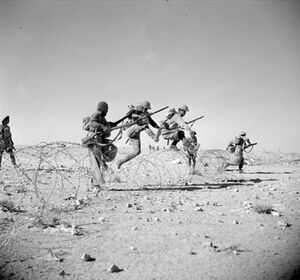Charge of the Maoru Battalion
This article is incomplete because it is pending further input from participants, or it is a work-in-progress by one author. Please comment on this article's talk page to share your input, comments and questions. Note: To contribute to this article, you may need to seek help from the author(s) of this page. |
The Charge of the Maoru Battalion took place on 24 December 1938 as part of the climactic stage during the Battle of Sania. As a last resort to prevent the Imperials from getting the upper hand, General Archibald Sugiyama sent the 28th Maoru Battalion to attempt to punch a gap into the Imperial lines at Al Zeb, where the village would prove to be instrumental to outflanking and allowing Brigadier Tsukuyo Kushineda's forces to push and counter Imperial attacks.
The resulting attack by the Maoru Regiment caused fright and disorganization into the Imperial lines. The attack had also distracted Quenminese and Archadian commanders from the focus of the counteroffensive, which Sugiyama took to his advantage and pushed forward by Christmas Day. When dusk fell, the Maoru Battalion had secured Al Zeb, allowing allied forces to push forward by the next day. The Maoru Battalion lost 67 troops and 27 wounded while the Imperials lost 327 troops and 1050 surrendered, the largest number of Imperials surrendering in a single-day battle to this day, while the remaining retreated or escaped being captured.
The charge became a symbol of Maoru prowess and discipline in the battlefield. The 28th Maoru Battalion, along with the 1st Maoru Regiment would go on to become one of the most feared formations in the New Akiba Army.
Background
The Battle
The Morning Charge
Imperials sent into disorganization
Aftermath
Eyewitness Accounts
Several Imperial soldiers and commanders initially had thought that the charge was to be carried out by regular Lucian forces and that the attack would simply be similar to an unaided infantry charge. However, on the the day of the battle, it was revealed that Maoru troops attacked. Never knowing that the Maoru troops had a policy of not taking in prisoners, the Imperials were shocked on the fighting tenacity the Maoru troops and their ruthlessness.
Captain Vincenzo Beniza, after retreating from the village wrote in his diary:
"When we learned that our lines were going to be attacked by Commonwealth troops, we prepared and expected that they were going to be the usual Lucian and Commonwealth troops. But it was different. I had never encountered such ferocity. Those men charged with their bayonets longer than ours or even of our Quenminese allies. They killed every man with every shot and bayoneted wounded men. They did not have any remorse or mercy for the Quenminese or Archadian, even if some Archadians were spared. I firmly believe that these men were trained to despise us, especially of our Quenminese allies. For all that I believe, these men hate the Quens a lot more than those Zussies or the Lucians. We eventually learned to respect their prowess and tenacity. I always knew that whenever our lines get broken in a single hour, it was the work of the Maoru troops."
Quotes
- After Sania, I learned to fear and respect a Kiwi. After the war, I am friends with the commander who defeated my men at Al Zeb and thought to never be enemies with them again.
— Field Marshal Victor Sazabio, 1946.
- They were literally tigers.
— 2nd Lt. Uất Ðình Thiện, 223rd Infantry Regiment
- With so much audacity and determination, they even surpass the fervor of the Quenminese soldier.
— Brigade General Kiều Dũng Quang
- I will not be dishonored by a horde of inferior savages.
- Imperial Marshal Thạch Hung Sõn Chiến, in the aftermath of the battle.
